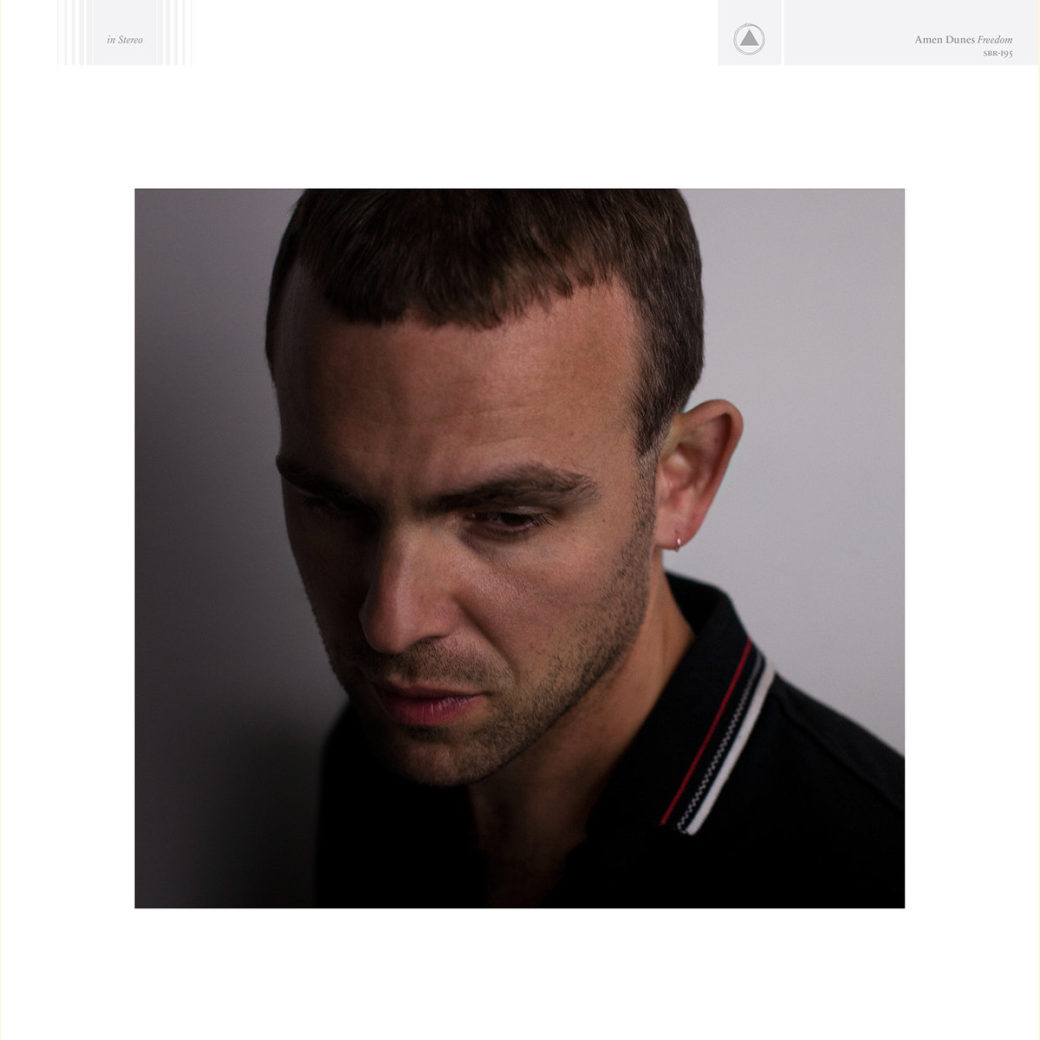Amen Dunes – ‘Freedom’

Psychedelic-folk singer Damon McMahon unveils a his record, which perfectly fits in the mostly dark, gloomy and psychedelic soundscape of his Sacred Bones label mates.
If The Soft Moon is the bad-tempered brother only wearing black and Föllakzoid the always trippy cousin coming home from a frost rave at 11AM, Amen Dunes is the profound weirdo with the guitar, waiting on the porch and playing Dylan songs. All sharing a common affection for a transcendental touch in their music. After three years McMahon retunes with his new record Freedom and compared to its predecessor Love from 2014 the sound is not that atmospheric any more and a little more down to earth – but still far from being grounded.
The most salient feature on Freedom is McMahon distinctive voice, sometimes whispering, sometimes shaking, but always clear, vivid and intense, like the one of a preacher man. Listening to the record it doesn’t surprise that McMahon names Bob Dylan as his biggest influence. Leaving all kinds of fixed song structures behind the songwritetells his stories, sometimes in a linear meditative way, sometimes underlaid with a rising tension that automatically drags you into a trance-like state. The songs evolve around characters and stories, imaginary and real, that in one way or another represent McMahon’s past, like the first single of the record Mika Dora, who was one of the most famous surfers and also an ambivalent character. ‘With lyrics of regret and redemption at the end of one’s youth, the song is about Dora, and McMahon, but ultimately it is a reflection on all manifestations of mythical heroic maleness and its illusions’, McMahon says. Underlaid by smooth repetitive rhythms and decently used synthesizer and organ sounds, adding a psychedelic touch to the blues-based fundament, the eleven songs on Freedom somehow make you feel like being comfortably drunk while weightlessly floating on a cloud with McMahon prominent voice as the only reference point in this well-arranged mix of folk, psychedelics, blues and authentic storytelling. (Abhilash Arackal)
Song to get you started: Believe
Stream it now: ► Spotify / ► Apple Music / ► TIDAL
Frankie Cosmos – ‘Vessel’

Their new album sees Frankie Cosmos combine Greta Kline’s wit with a fast-track of instrumental twists and turns.
New York City singer-songwriter Greta Kline has come a long way since releasing quaint, noisy bedroom recordings on her Bandcamp back in 2011. By now, her project Frankie Cosmos has become a household name in the independent guitar pop genre, and Kline is backed by a revolving cast drafted from the New York music scene, both on tour and in the studio. Their latest collaborative effort Vessel might appear opulent even by Frankie Cosmos standards, but don’t get trumped by its 18 tracks: the album is only a little more than half an hour long, and most of the songs don’t exceed the 2-minute-mark.
Brevity in form has always been a hallmark of Kline’s, and songs like the upbeat Accomodate or the reflective I’m Fried appear fully-formed without any necessary intros, embellishments, repetitions and codas. Using this approach, Frankie Cosmos pack a lot of ideas into tiny songlets: on Ballad Of R & J, Kline duets with her band mate David Maine, while the slightly longer Being Alive manages to hop between lovelorn and frantic, switching tempos continuously while passing the mic around. Pay attention to Kline’s lyrics on these songs though, and you’ll hear her zooming into granular view with endearing detail: ‘I knew that I shouldn’t call you / But in this light we are all blue’. Luckily, the next song and a more pleasant sentiment might be just around the corner. (Igor Franjić)
Song to get you started: Apathy
Stream it now: ► Spotify / ► Apple Music / ► TIDAL
Pttrns – ‘Material und Geschichte’

Pttrn’s third full-length record Material & Geschichte is an infectious story of texture and rhythm. Once gotten into it, there is no return.
The so-called Cologne scene knows well about Pttrns and their fantastic skills that help shape as well as create top notch tunes and, more importantly, interesting records as a whole. However, outside this particular environment, the band has remained somewhat of an insider’s tip. This is hopefully going to change with their third full-length album Material & Geschichte (Material & History). It’s no news that record labels (or musicians themselves) consider current works of artists as their most outstanding one to date. In case of Pttrns, this assumption hits the nail right on the head: Considering the press release, it all seemed to having started with a theory of pervasive futurity then turned into the leitmotif of the musicality of the eight new tracks. What reads rather cryptic might be translated with the merging of indie rock, funk, electronica, and kraut – accompanied by reverberating lyrics. Material & Geschichte carries a grandiose apparatus of texture with it, yet it’s such a pleasant, an irresistible listen. This is why:
For this record, Pttrns spent a whole summer in Berlin letting also guest musicians like Rabea Erradi (Die Heiterkeit) take part in the recording process of Material & Geschichte. This makes the band’s third album have a fruitful range of new influences expressed by its flawless sound: Next to the classic indietronic arrangements, for example a saxophone comes into play furnishing Pttrns’ sound with sublime grandezza. Andreas Spechtl of Ja, Panik produced the album and did an exceptional job. Everything about this record is vivid and vibrant: Traditional pop structures are broadened, the songs are given the air to breath they need and require. Still, in spite of lasting often between five and eight minutes, the songs never lose their catchiness. Repetition is allowed as a major tool but the sheer amount of details this record incorporates only unveils after a couple of listens. It’s the eclectic texture of Material & Geschichte that makes you want to return to it. Balancing an impressive ambiguity, the band’s latest effort works for the body and soul as well as for the mind and the heart. It will have thrilled you before you realise it. Its future is yours. (Chris Hegholtz)
Song to get you started: Armado
Stream it now: ► Spotify / ► Apple Music / ► TIDAL
Desperate Journalist – ‘You Get Used To It’

Solid new material from the critically underrated British wave rockers has arrived, showing that you can mix despair with determination.
British post-punk band Desperate Journalist has been a reliable and quite restless force in the independent music landscape for quite some time. Not a year passes without a new release and tour from the furious four-piece, usually a rotation between full albums and EPs. You Get Used To It follows last year’s Grow Up album, providing five brand new songs from the group that continue to carry their formula to new heights. Somewhere between Siouxsie And The Banshees, Psychedelic Furs and other sinister legends singer Jo Bevan and her group found their own niche, and carefully foster it with every new release. The group’s latest release starts a bit more epic with the rough Incandescent that slightly references The Cure in parts. All in all the sound of Desperate Journalist has gotten a bit more melodic since their self-titled 2015 debut LP.
Songs like Nothing Happens and About You are a bit lighter in general although they still carry that dark and desperate notion, especially due to Bevan’s honest vocal performance. Her voice, slightly resembling the late Dolores O’Riordan of The Cranberries, is the distinctive centre of the music, carrying the emotional weight while also comforting the listener. It’s that notion that makes the sound of Desperate Journalist so timeless and relatable. It might be their most optimistic output so far as the band greets its demons with a confident ‘Screw you’ as all things will work out right in the end anyway. Thank god, they can’t shake off the bittersweet taste of life because … well, their music would be a bit less enjoyable then, right? (Norman Fleischer)
Song to get you started: It Gets Better
Stream it now: ► Spotify / ► Apple Music / ► TIDAL
Sunflower Bean – Twentytwo In Blue

New Yorkers wrap themselves in the past, but do it well on second album.
My dad has a record player, one with wooden panelling and designed in the classic 50’s/60’s style. And it looks and sounds great. But the thing is, it was made in 2011. That sort of expertly executed retro-ism is also at the heart of Sunflower Bean‘s new album, TwentyTwo In Blue. The New York trio have dipped into their record collections and come up with an album that, sonically, alternatively dresses up as Fleetwood Mac, T-Rex and the Spiders From Mars.
Of course, for a lot of people, that’s enough of a reason to turn off: who wants to hear a bunch of 2018 kids attempt to replicate the past, regardless of well they do it? That’s more of a musical philosophy question, on whether modern musicians not only need to express themselves, but also need to find new styles and ways of doing it. What matters from the record’s point of view is that even though they’re running down paths already cut, Sunflower Bean are experts at it. This is an album packed with superb songwriting and musicianship, and Julia Cumming’s vocals are pure honey running through the album. It peaks with the (almost) title track, a stunning exploration/anthem for the young and confused. This is a album that pretty much could have come out in 1975 and not-sounded forward-thinking, but it is a good one regardless, and you can’t expert wheel-reinvention from every band on every record. Who knows, Sunflower Bean may establish themselves as boundary-pushers on future outings. For now, they’re a very good band, and Twentytwo in Blue is a very good album. (Austin Maloney)
Song to get you started: TwentyTwo
Stream it now: ► Spotify / ► Apple Music / ► TIDAL


